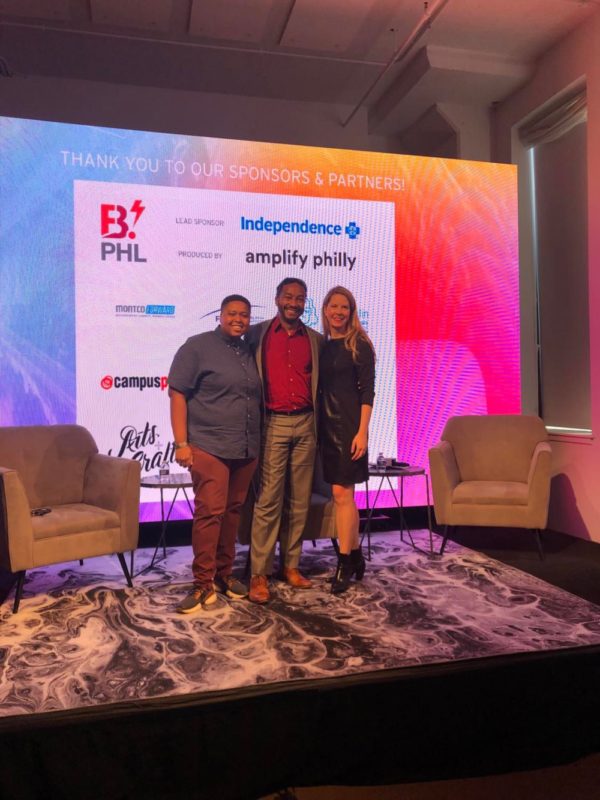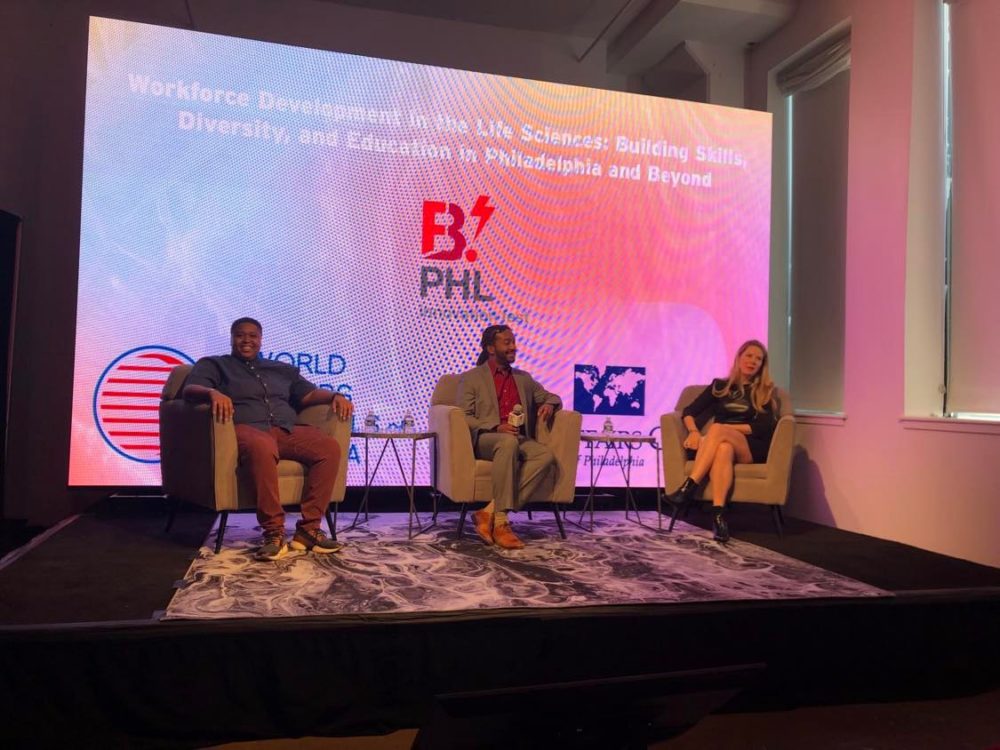That eye-popping stat comes from the University City Science Center’s 2022 report Greater Philadelphia Cell and Gene Therapy Workforce Update, a follow up to the 2020 Cell and Gene Therapy and Connected Health Workforce Analysis study. It translates to potentially thousands of open roles in the region known by the branding obsessed as Cellicon Valley.
And yet, that stat doesn’t necessarily mean Philadelphians in need of wages that would support a higher quality of life are trained for those available life science jobs — or even know they exist.
A Friday morning panel called “Workforce Development in the Life Sciences: Building Skills, Diversity and Education in Philadelphia and Beyond” during the 2022 B.PHL Innovation Fest dove into the barriers and opportunities for the life science industry’s workforce.
Phil Brooks, director of STEM workforce partnerships at the Science Center, and Tia Lyles-Williams, founder and CEO of both LucasPye Bio and HelaPlex, both sat on the panel moderated by Lauren Swartz, president and CEO of the World Affairs Council of Philadelphia.
Brooks’ work centers on exposure to professional opportunities through workforce development programs. Lyles-Williams said HelaPlex, a forthcoming Philly life sciences workspace, is planning a pilot program — the HelaPlex Biotechnology Workforce Development Training Program — for summer 2023 to train people trying to get into the life sciences. Both have a focus on diversifying the field. HelaPlex’s name is even inspired by the case of Henrietta Lacks, the Black Maryland woman whose cancerous cells were cloned in the 1950s without her consent and used for the development of medical breakthroughs such as vaccines and genetic mapping.
HelaPlex is “not just being an advocate of members of marginalized communities, to go after these jobs — we’re actually being leaders and protectors,” Lyles-Williams said, adding that she wants people to not just get a life sciences job, but be successful in that job and in the industry. The program is targeted toward such communities including women, people of color and members of the LGBTQ+ community.
Barriers to entering the life sciences field
Swartz asked what specific skills Brooks and Lyles-Williams thought were necessary for someone to get started in this field and not feel intimidated by any barriers they might face.
Brooks and Lyles-Williams both said anyone can build a career in the industry, not just those with Ph.D.s or people who look a certain way or come from a certain background. But Brooks noted a lack of communication between life science companies and the rest of Philadelphia: Companies know what they need, but the community doesn’t know of the opportunity.
“We sit down in meetings,” Brooks said about life science companies, “we have research, we do all these amazing things. But now it’s time to act. We have the information at our fingertips.”
He said soft skills, such as communication, are useful, but it’s also important for potential employees to be familiar with certain terminology and equipment. Programs such as the Science Center’s short-term Building an Understanding of Lab Basics (BULB) teach those basics to Philadelphians and don’t require a degree for participation.

Equity from the top down
What are these programs doing to ensure that employers are creating an environment to help people entering the field thrive?
Lyles-Williams noted that she’s a member of the Philadelphia STEM Equity Collective, and its efforts to build a cultural training program for employers. And the HelaPlex program is specifically important to her because in the 22 years she’s been in this industry, she’s never been hired directly, but instead through a temp agency or hiring agency, she said. That’s meant she’s had to start over in terms of benefits, PTO and pay every time she started at a new company. With this new program she’s starting, graduates will be hired as full employees from day one.
“It needs to be us not just being patients and taking medicine in this industry,” Lyles-Williams said. “We need to be actually participating either as an employee, an entrepreneur, or a high level C-suite executive to bridge that wealth gap in marginalized communities.”
Brooks told Technical.ly he credits his own success to a great education, and he’s passionate about providing opportunities to both youth and adults who are looking for them.
“There are companies coming in, both tech companies and life science companies and healthcare companies, who are constantly saying, ‘Oh, we’re looking for talent. We can’t find it,’” he said. “But you know, folks like me … they’re making communications and contacts with companies in a way that will inform how they train individuals over the long term.”
Brooks does think Philadelphia has the potential to be a city where life science companies put roots down and source their talent locally, and that Philadelphia is in a better position to do so than competing cities. But it will take commitment from local stakeholders.
“The potential is here,” he said — “but if you don’t actively push forward to make sure things are getting done, if you don’t act on the potential, then it’s a moot point.”







